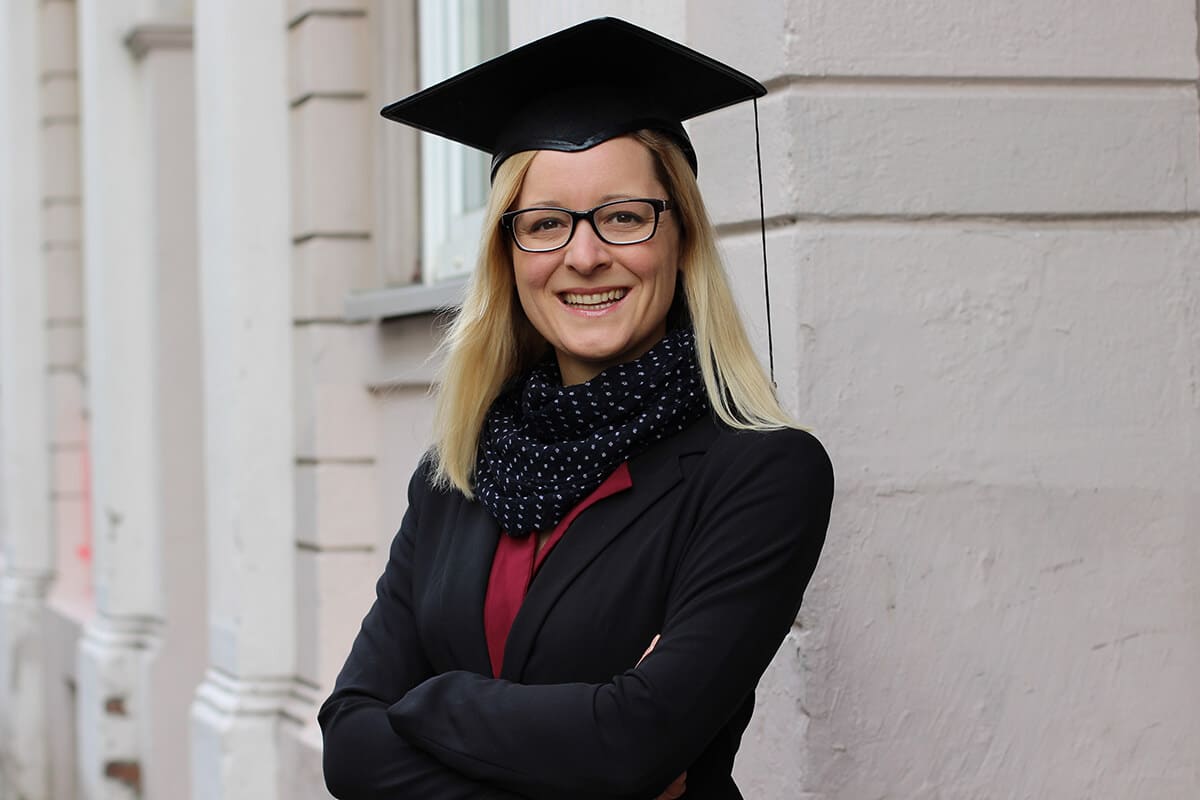After the dissertation you will not be the same person as before. A guest article by Marlies Klamt.
“Before the diss, I was just a normal person.”
is written on the front of my business cards. By this I mean that the burdens that come with a dissertation can sometimes drive you to the brink of insanity.
But what is also in this saying is the message: after the dissertation you will not be the same as before. And that, in turn, is not necessarily a bad thing. On the contrary.
To a large extent, you do your doctorate on your own – especially in the case of individual doctorates, but also in the case of cumulative doctorates or doctoral theses that are produced at a graduate college. Therefore, the many challenges that arise during the doctorate must be solved independently.
Even if it is unclear when the time will come and in relation to which component of the dissertation, I dare to predict from my own experience as well as from numerous conversations with female doctoral candidates: The first crisis is bound to come.
The good news
For every problem there is a solution or many from which you can choose. And with each hurdle you overcome, you not only moved a little closer to your goal of earning a doctorate, but you also expanded your own skills and developed or strengthened personality traits that will help you in the future. One’s own treasure chest of coping strategies is thus filled over the period of the dissertation. Each crisis mastered by your own strength creates a new pearl in the chest of your abilities and qualities.
The promotion regularly invites you to move out of your comfort zone and offers multiple opportunities for inner growth.
I’d like to introduce you to some of the challenges that can arise during your doctoral years – and pair them with the opportunities that arise.
Growth opportunity 1: Find sources of recognition and affirmation
The challenge
For years, you research away at your own desk before the doctoral thesis sees the light of day – especially in the case of monographic individual doctorates. The lack of outside recognition and validation are fertile ground for doubts about whether what you’re doing is any good and meets the standards for a dissertation.
The Learning
This challenge offers two distinct opportunities for advancement.
On the one hand, you can actively ask for feedback – from the supervisor or by making yourself visible in other ways, e.g. by giving talks in colloquia and at conferences or by publishing articles.
On the other hand, you can also try to improve your self-assessment by making yourself less dependent on the judgments of others. This promotes your independence as a scientist. This becomes all the more important the further you climb the university career ladder: Professors are not bound by instructions and must be able to rely on their own judgment. The doctorate thus offers the opportunity to develop a self-image as an independent scientist and to learn to take a position and justify it to others – a good exercise for the defense of your dissertation.
Growth Opportunity 2: From Overload to Self-Care
The challenge
Another classic of PhD problems: the overflowing To Do list and the accompanying overwhelm of what you should start or continue with. In addition, there is often the job at the university, which demands time and energy and the guilty conscience, which accompanies you permanently and ensures that you can not switch off even if you have shoveled a day off.
The Learning
These challenges also offer wonderful opportunities to grow if you are willing to take care of yourself and your needs. You can do this by learning to separate yourself, set priorities, and take your doctoral project as seriously as the work you do for others.
Growth opportunity 3: Self-assertion and needs-based communication
The challenge
One challenge that, although fortunately not all, many female doctoral candidates face is conflict with their supervisor. The reason for this can be manifold and range from an outstanding feedback to criticism of the work already done.
The Learning
This promotional challenge offers learnings that are useful for every walk of life. You can learn to assert yourself and stand up for your needs on the one hand, and on the other hand, to communicate your goals and desires in such a way that you actually achieve them. The type of communication needed can vary greatly depending on the other person and may not necessarily be the type you normally prefer for communication.
Growth opportunity 4: Develop confidence in the future
The challenge:
It is not uncommon for graduation to be a time when fears about the future arise. Even though it is exhausting to write a dissertation, you are still in the protected space of the university. You may have stayed there right after you finished your master’s thesis. It may even have been the fear of “real life” (= life outside the university) that made a doctorate seem like an attractive alternative to starting a career at the end of their studies. As the dissertation nears its end, the questions you ask yourself about the future become more urgent now:
- Can I manage to become a professor? To be placed in a field when there are so many more female applicants than there are jobs?
- Can I imagine another job in science or at the university?
- Have I perhaps realized that I don’t want to stay at the university at all because the system doesn’t suit me, my personality and my values?
- Do I have no idea what to do instead and fear of not finding a job due to lack of non-university work experience?
The Learning: Self-Confidence & Resilience
As I show in this article, the road to a PhD is not only paved with challenges, but also offers as a reward a bit of bolstered self-confidence for each crisis mastered. This helps to strengthen your self-confidence and build up your resilience, i.e. your psychological and emotional resistance. Strong self-confidence, in turn, shrinks anxiety about the future. Good resilience increases your faith in your ability to deal with uncertainty: Come what may, your doctorate has taught you that you are not helplessly at the mercy of crises, but can overcome them on your own.
The formula for growth

Problems, problems, problems… Besides the challenges mentioned above, a PhD raises many more: The chosen approach does not bring the desired results; someone publishes an article that questions one’s own work; the doctoral mother finds the very part of the research that one is particularly proud of superfluous…
Every critical event is an opportunity to get to know your own values better. This, in turn, can help you find the solution that is most coherent for you.
The increase in knowledge that naturally comes with a doctorate may be transferable to your personal life.
The criticism your work receives is an opportunity to practice how you deal with being judged by others.
So every challenge gives you the opportunity for growth. In a nutshell, we can say:
Problems + the experience of being able to solve them = resilience & self-confidence
Doing a doctorate to develop your personality?
Before I get too carried away about the many opportunities for personal development that a dissertation offers: for this reason alone, I would not recommend a doctorate to anyone.
Writing a dissertation is a little like going through years of childbirth (except your baby dissertation doesn’t need any more help after it’s born). Those who do not have the right motives – interest in the topic and in scientific work – will either throw in the towel prematurely or have little fun with their doctorate.
So please do not do a PhD just to develop your personality. Life holds enough other opportunities in store for that.
But if you’re already in the middle of it, or were planning to do a PhD anyway, I’d like to invite you to look at the challenges of doing a PhD in a new light. And to remind yourself regularly that it’s the difficult times that can be the ones where you can learn the most and grow the most – if you’re willing to work on yourself.
With this in mind, use your promotional time to stock your very own treasure chest with new pearls of your personality. And to polish up already existing ones.
About the author Dr. Marlies Klamt

Dr. Marlies Klamt is a promotions coach and runs the podcast “Happy doctorate. The podcast for women who enjoy doctoral studies“. Prior to her self-employment, she was employed at the university for about eight years in various positions: as a research assistant at the Journalism Seminar at the University of Mainz, as a project coordinator in the Equal Opportunities Office at the University of Frankfurt and as a substitute professor for Journalism II – Audiovisual Publishing at the University of Mainz.
To the website of Dr. Marlies Klamt: https://promotionsheldin.de.
Click here to go directly to the podcast “Happy doctorate”.
More articles on the subject of study:
- Is it even possible to study and have a job? – Yes, with a lot of fun and passion!
- The study as a foundation for the future
- 6 tips for a successful career start after graduation
- Young female scientists pushed into the academic proletariat
About the author
Dr. Marlies Klamt is a doctoral coach and runs the podcast "Glücklich promovieren. The podcast for women who enjoy doing their doctorate". Before starting her own business, she worked at the university for around eight years in various positions: as a research assistant at the Journalism Seminar at the University of Mainz, as a project coordinator in the Equal Opportunities Office at the University of Frankfurt and as a substitute professor for Journalism II - Audiovisual Publishing at the University of Mainz.
- Diese*r Autor*in hat bisher keine weiteren Beiträge.









